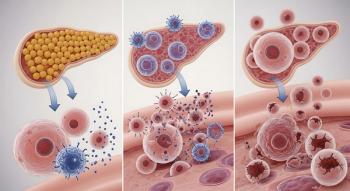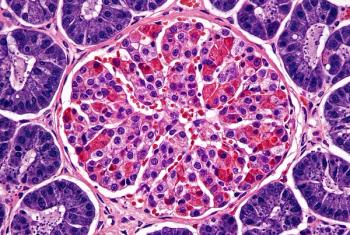
Adult-Onset Type 1 Diabetes Increases Risk of Cardiovascular Disease
The risk of major cardiac events was 50% higher in adult-onset type 1 diabetes than in population controls, and the risk of death from diabetic coma or ketoacidosis was seven times as high as those with type 2 diabetes.
People diagnosed with type 1 diabetes as adults have an increased risk of cardiovascular disease and death, according to a new study done by researchers at Karolinska Institutet in Sweden.
The study, published recently in the
“The main reasons for the poor prognosis are smoking, overweight/obesity and poor glucose control. We found that they were less likely to use assistive devices, such as insulin pumps,” first author Yuxia Wei, postdoctoral fellow at the Institute of Environmental Medicine, Karolinska, said in a news release.
Researchers identified 10,184 people diagnosed with type 1 diabetes in adulthood between 2001 and 2020 and compared them with 509,172 matched people in the control group. This study assessed people with adult-onset diabetes, focusing on those who were 40 years of age when the diagnosis was made.
They found that people with type 1 diabetes had a higher incidence of major adverse cardiovascular events (MACE), all-cause mortality, and mortality from cardiovascular or non-cardiovascular diseases, cancer, or infection than population controls. Those who were overweight or obese (19.8%), who smoked (8.4%), and who had high HbA1c (8.8%) accounted for most MACE events.
The researchers plan to continue investigating adult-onset type 1 diabetes, including risk factors for developing the disease and the prognosis of other outcomes, such as microvascular complications.
The study was funded by the Swedish Research Council and the Swedish Diabetes Foundation, among others.
Type 1 diabetes is an autoimmune disease that affects about 2 million Americans, about 5% to 10% of all diabetes cases, according to the Centers for Disease Control and Prevention (CDC). In type 1 diabetes, the immune system’s T cells destroy the insulin-producing beta cells.
People of any age can get type 1 diabetes, although it usually develops in children, teens and young adults. But as many as 40% of people with type 1 diabetes are unaware that they have the disease. Healthcare providers recommend that screening for type 1 diabetes should include adult populations to avoid the potential misdiagnosis of type 2 diabetes, which has a different standard of care. Type 1 diabetes is treated with insulin replacement.
Currently, there is no recommendation for general screening for type 1 diabetes. Screening for islet autoantibodies associated with type 1 diabetes is done for those with a first-degree relative with the disease.
But last year, Breakthrough T1D, along with 10 international diabetes organizations, developed guidance for healthcare professionals who monitor and care for people with type 1 diabetes. The guidance aims to provide a consensus on autoantibody testing and monitoring to identify those with early-stage type 1 diabetes whose disease could progress.
People of any age can get type 1 diabetes, although it usually develops in children, teens and young adults.
Newsletter
Get the latest industry news, event updates, and more from Managed healthcare Executive.

























